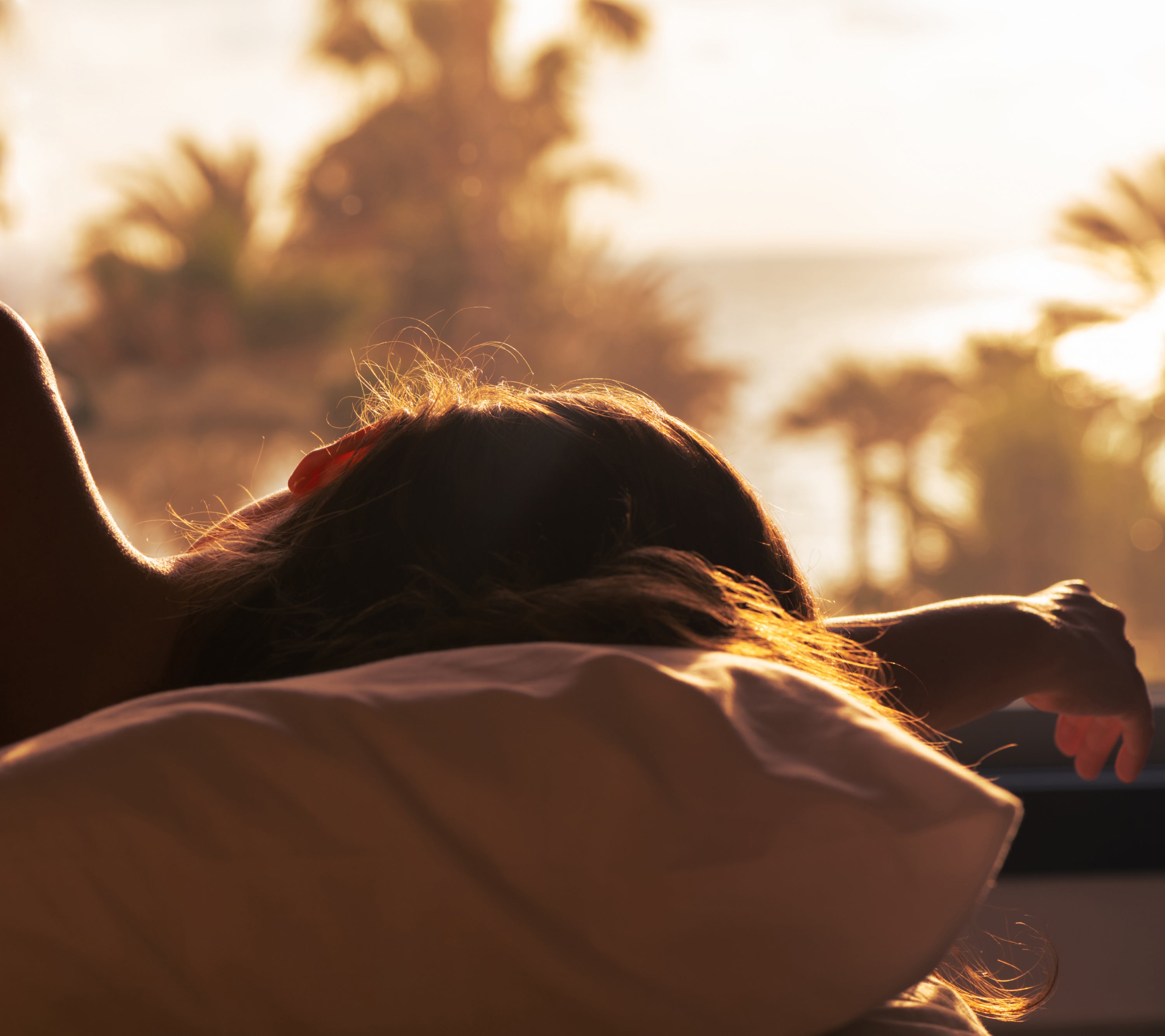It's getting warmer, and days are getting longer. That doesn't mean your sleep has to suffer.
Summer brings outdoor adventures, vibrant energy, and more daylight hours. But the warmer temperatures can also pose challenges when it comes to getting a restful night's sleep. Quality sleep is crucial for our overall well-being and cognitive function, and it becomes even more critical to get good sleep when the heat and longer days can disrupt our sleep patterns.
Your circadian rhythm, or internal clock, is most likely adjusting to the longer days by winding down later. Alternatively, you may fall asleep fairly quickly, but the early sunrise wakes you up earlier than you'd hoped. That is fine, but if your calendar doesn’t adjust to the changing daylight, you may be left exhausted and underslept. Light suppresses the body's production of melatonin [1]. So as the days get longer, your circadian rhythm adapts to the changing hours of daylight, pushing back the production of melatonin (the hormone that makes you feel sleepy) to meet the new sunset.
We put together a list of neuroscientist-approved sleep hacks to create a sleep-friendly environment:
5 tips to sleep soundly all summer long
- Establish a routine and stick to it: The number one tip? Going to bed and waking up at the same time every day. Yes, this means getting up at the same time every morning, no matter how tired you feel — which will help your circadian rhythm adjust. The summer season often brings a more robust social life — summer barbecues, bonfires, concerts, and more — and a lot of people tend to go to bed later. Joining your community and socializing are critical to your health, too, so it’s important to find the balance and aim for consistency, while lending yourself some grace when things don’t go as planned.
- Stay cool: The ideal temperature for adults is between 60 and 67 degrees F, while infants sleep best in slightly warmer environments (about 69 degrees F) [2]. Taking a warm bath or shower about 90 minutes before bed can also help you sleep by lowering your internal body temperature [3]. Does this sound counterintuitive? A warm shower helps lower your body temperature, is an indicator for your circadian rhythm and allows melatonin to increase [3]]. Consider using a fan or air conditioner to regulate the temperature in your bedroom effectively. Choose lightweight, breathable bedding materials like cotton or linen that allow better airflow and prevent excessive sweating.
- Darkness is your friend: A dark environment will help you log the right amount of sleep despite the sun's best efforts to wake you up. While blackout shades are an investment, they are a great way to maintain a cave-like vibe in your bedroom. On a tighter budget? Get a blackout eye mask. They're incredibly comfortable and keep all rays of light out. Our favorite eye masks are from Manta Sleep and Bon Charge.
- Avoid social jetlag: You may have experienced the adverse effects of jetlag when traveling east to west or vice versa, but you may be shocked to realize that you might be putting yourself through "social jetlag" every week. Elise Facer-Childs, a doctoral researcher specializing in sleep, explains that a lot of our society suffers from social jetlag because we follow a particular schedule during the week for work and follow a different schedule during the weekend, primarily due to staying up late socializing, then sleeping late the next day as a result. For example, if you typically go to bed at 10 P.M. on weeknights and wake up at 6 A.M. on weekdays for work but stay up on Friday and Saturday evenings past midnight and then sleep in late, it's like traveling between New York and Los Angeles weekly. No wonder Mondays can feel like a drag.
- Greet the day with the sun: Try to get as much sunlight as possible in the first part of your day. That means opening the blinds and stepping outside to get some sunlight. Even if it's cloudy or overcast, getting out early in the day is still beneficial to help support your circadian rhythm, promoting better sleep.
Not sleeping well? Try this.
The Apollo wearable supports sleep because it can help stabilize and reset your circadian rhythm. When your circadian rhythm stabilizes, you naturally feel tired and alert at predictable times each day. This makes you much less susceptible to midday exhaustion or tossing and turning throughout the night. And it may help you avoid that second (or fourth) cup of coffee.
Scenario 1: "I have trouble falling asleep."
Today, 90% of people have trouble falling asleep (source: Harmony Healthcare IT1). Falling asleep starts long before you climb into bed. Using the Apollo™ wearable throughout the day can give you a hold on stress, making unwinding into a restorative sleep much more accessible. Explore the following Apollo™ Vibes to flow through your day effortlessly.
☀️Apollo for mornings: Start your day refreshed and clear-headed so you can tackle your to-list and feel good about your accomplishments. Try Focus to filter out distractions at around 20% intensity for 30-60 minutes. Use the Energy Vibe if you need an extra boost to get going in the morning or an afternoon pick-me-up at 10-20% for 15 minutes.
🤸Apollo for movement: Create a body-to-mind connection that helps with endurance, physical recovery, and getting into a flow state. Energy is a favorite Vibe for pre-workout motivation and to help reduce the need for extra caffeine during the day. After you workout, use Recover Vibe to bring balance to your nervous system and give your body the balance it needs. This Vibe also improves recovery within just 2-3 minutes of use in between sets in interval training.
🧑💻Apollo for focus: Set your wearable to Focus starting at 20% for 15-60 minutes — continue with this Vibe as needed throughout the day to keep your energy up and your head clear. For clear creative work or social flow (like socializing with friends, family, or colleagues when you're tired after work), use Social starting at 30-40% from 30-60 minutes.
💡Apollo for afternoon recharge: Your afternoon slump doesn't stand a chance. Rather than reaching for caffeine, try Energy Vibe for 15 minutes at 10-20%. If you have time for some shut-eye, try Power Nap Vibe for 30 minutes. As your nap time ends, Power Nap will gradually wake you so you can wake up naturally.
🧘Apollo for calm: Set the Apollo wearable to Calm Vibe starting at 35% for 15-60 minutes for a calm flow state, to deepen meditations, to reduce restlessness, or for aches and pains.
🌛Apollo for unwinding: Transition from your busy day with the right amount of patience and attentiveness for your partner, friends, or kids. Use Unwind Vibe for deep relaxation while reading, watching TV, or getting ready for bed, starting at 40-50% for 15-60 minutes.
🛌Apollo for sleep: Sleep tight with a wearable that lulls you to sleep. Use the Fall Asleep Vibe to quiet your mind and ease into a restful sleep. Once you're in bed, schedule the Apollo wearable to Fall Asleep Vibe starting at 40% for 60 minutes.
😴Getting back to sleep with ease: If you wake in the middle of the night, you can simultaneously click both buttons on the device to reactivate your chosen sleep Vibe to help you fall back asleep and decrease wakefulness in the middle of the night.
Scenario 2: "I can't stay asleep."
Everyone knows what it feels like to wake up in the middle of the night and not be able to fall back asleep. Stay Asleep™ detects when you begin to stir and responds by delivering gentle, soothing vibrations to help keep you asleep so you wake up feeling rested with the energy to take on the day. Stay Asleep is a new feature exclusive to Apollo Labs.
Scenario 3: I wake up exhausted.
If you're wondering why you're still tired after eight hours of sleep, you might feel the pressure of one of the most famous one-liners among them: the idea that eight hours is the gold standard of rest. This and other sleep misconceptions can cause you to overlook links between your sleep habits and your physical and mental performance throughout the day.
If you are someone with a history of trouble sleeping or you have a complicated relationship with sleep, it may feel overwhelming and hard to believe that little changes will make a big difference in your sleep quality and energy levels. Introducing changes one by one creates a cascade effect, and your sleep will become increasingly more restorative. The change in routines and boundaries around your sleep will feel automatic and effortless. Sweet dreams, and happy summer!





